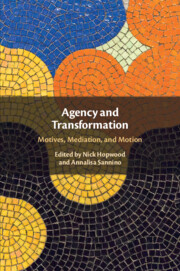Book contents
- Agency and Transformation
- Agency and Transformation
- Copyright page
- Dedication
- Contents
- Figures
- Tables
- Contributors
- Preface
- Acknowledgments
- Chapter 1 Motives, Mediation and Motion
- Chapter 2 Toward a Power-Sensitive Conceptualization of Transformative Agency
- Chapter 3 The Tasks of Reality and Reality As the Task
- Chapter 4 A Relational View of a Future-Orientated Pedagogy
- Chapter 5 From Future Orientation to Future-Making
- Chapter 6 Excluded Lives
- Chapter 7 Children’s and Youth’s Civic Projects and Responsible Agency
- Chapter 8 Decolonizing Agency
- Chapter 9 Unpacking Social Articulation of Agency
- Chapter 10 The Emancipatory Nature of Transformative Agency
- Chapter 11 Choice in Childbirth, Agency and Collective Action
- Chapter 12 Transformative Agency by Double Stimulation in an Ecological Agroforestry Association from Brazil
- Chapter 13 Transformative Agency and the Cultivation of Innovations in Frontline Homelessness Work
- Chapter 14 Children’s Agency during the COVID-19 Pandemic in China
- Chapter 15 Agency As the Direction and Reach of Actions
- Index
- References
Chapter 3 - The Tasks of Reality and Reality As the Task
Connecting Cultural-Historical Activity Theory with the Radical Scholarship of Resistance
Published online by Cambridge University Press: 23 November 2023
- Agency and Transformation
- Agency and Transformation
- Copyright page
- Dedication
- Contents
- Figures
- Tables
- Contributors
- Preface
- Acknowledgments
- Chapter 1 Motives, Mediation and Motion
- Chapter 2 Toward a Power-Sensitive Conceptualization of Transformative Agency
- Chapter 3 The Tasks of Reality and Reality As the Task
- Chapter 4 A Relational View of a Future-Orientated Pedagogy
- Chapter 5 From Future Orientation to Future-Making
- Chapter 6 Excluded Lives
- Chapter 7 Children’s and Youth’s Civic Projects and Responsible Agency
- Chapter 8 Decolonizing Agency
- Chapter 9 Unpacking Social Articulation of Agency
- Chapter 10 The Emancipatory Nature of Transformative Agency
- Chapter 11 Choice in Childbirth, Agency and Collective Action
- Chapter 12 Transformative Agency by Double Stimulation in an Ecological Agroforestry Association from Brazil
- Chapter 13 Transformative Agency and the Cultivation of Innovations in Frontline Homelessness Work
- Chapter 14 Children’s Agency during the COVID-19 Pandemic in China
- Chapter 15 Agency As the Direction and Reach of Actions
- Index
- References
Summary
This chapter’s overall argument is that to advance cultural-historical activity theory, at this time of a severe sociopolitical and ecological crisis, it is imperative to amplify connections to the radical scholarships of resistance immersed in social justice struggles. I address how Marxism and Vygotsky’s approach directly align with this scholarship, on an array of positions, in contrast to approaches that do not prioritize such struggles. Using the transformative-activist stance (Stetsenko, 2017a) - premised on Marxist/Vygotskyan foundations, inclusive of a unified ethico-ontoepistemology - and while connecting to contemporary scholarship of resistance, I further the notion of agency in several steps (relevant also to motives). The core argument posits agency at the nexus of a seamless, ever-evolving/moving process of a mutual self-and-world co-realization, while problematizing reality as a task and gearing agency to the tasks of resistance. Additionally, the chapter sets the stage to interrogate charges of eurocentrism and anthropocentrism in Marx and Vygotsky.
Keywords
- Type
- Chapter
- Information
- Agency and TransformationMotives, Mediation, and Motion, pp. 56 - 83Publisher: Cambridge University PressPrint publication year: 2023

